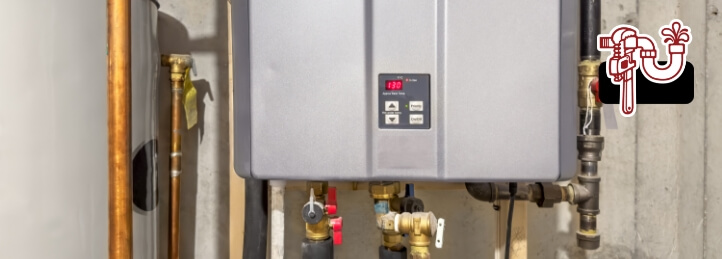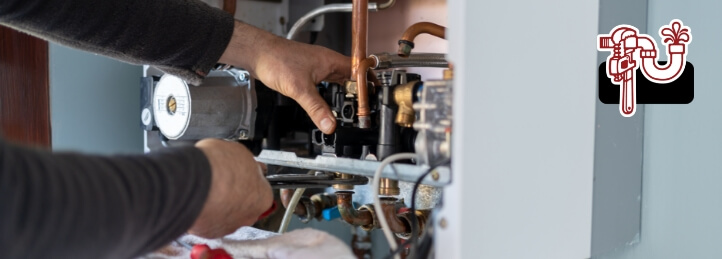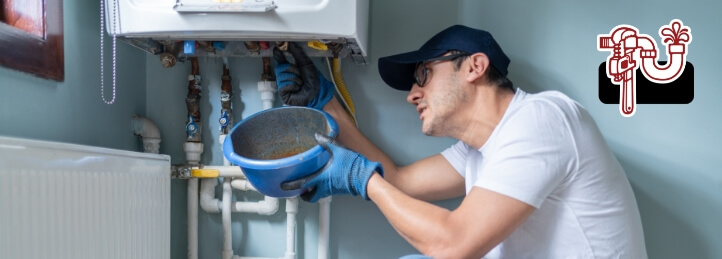Water Heaters

Finding a dependable water heater service provider is crucial to maintaining a comfortable home. Whether you’re considering a replacement, need repairs, or want to upgrade to a more efficient system, choosing a company that delivers quality and customer commitment is essential. Here’s what we bring to every job:
- Members of PHCC, QSC, BIAW
- In-House Apprenticeship Program
- A Positive Work Environment
- Pride and Professionalism
Swift Plumbing & Heating understands that a functional water heater is a necessity for a comfortable and efficient home. Here’s what you should know about water heater repairs, replacement options, tankless vs. storage options, and the steps you can take to maximize efficiency.
Contact Swift Plumbing & Heating for water heater services that stand the test of time in Port Townsend, Silverdale, and throughout the Kitsap Peninsula. We are proud to serve you!
Understanding the Need for Water Heater Replacement
Knowing when to replace a water heater is vital for safety and energy efficiency. Traditional storage tank water heaters generally last about 10-15 years, while tankless systems can last 20 years or more with proper maintenance. If your system is reaching the end of its lifespan, it’s time to consider a replacement. Some key signs include:
- Inconsistent Water Temperature: If your hot water supply is inconsistent, it could indicate sediment buildup or failing components.
- Leaks Around the Unit: Pooled water or rusting around the tank usually means internal corrosion and points to a replacement need.
- Strange Noises: Rumbling or popping sounds often indicate sediment accumulation, which, over time, reduces the unit’s efficiency.
- Higher Energy Bills: Older water heaters can become inefficient, requiring more energy to produce hot water.
Replacing an outdated unit can help prevent further issues, lower energy costs, and ensure reliable hot water.
Water Heater Repair: Common Issues and Solutions
Sometimes, a complete replacement isn’t necessary, and a repair can extend the life of your current system. Here are some common problems our team addresses:
- Pilot Light or Ignition Problems: For gas water heaters, a faulty pilot light or thermocouple can prevent the burner from igniting. For electric units, the heating element or thermostat may need replacement.
- Leaking Pressure Relief Valve: When water pressure gets too high, the temperature and pressure (T&P) relief valve releases water. If it’s leaking consistently, it may indicate a pressure issue or a faulty valve.
- Sediment Buildup: Over time, sediment from hard water settles at the tank’s bottom. This sediment layer forces the system to work harder and can even damage the tank if left unaddressed. Flushing the tank annually can resolve this.
- Temperature Issues: If the water isn’t reaching your desired temperature, the thermostat might be set incorrectly or may need to be replaced.
Regular repairs and maintenance keep your water heater operating efficiently and can extend its useful life.
Tankless Water Heaters and Storage Tank Water Heaters
When replacing a water heater, homeowners often choose between tankless and traditional storage tank models. Here’s a look at the benefits and considerations of each type:
Storage Tank Water Heaters
Traditional storage tank water heaters keep a reservoir of hot water ready to use, making them the more familiar option for most households. Here are the benefits and considerations:
- Lower Initial Cost: Storage tank water heaters are typically more affordable to purchase and install than tankless units, which can be beneficial for households on a budget.
- Simplicity and Reliability: These units are easy to operate and maintain, with fewer components that could malfunction.
- Readily Available Hot Water: Since storage tanks keep a supply of hot water, they can handle multiple demands, such as showers and laundry, at the same time. However, they do have limits and may need time to reheat once the tank is depleted.
- Energy Loss: Storage tank heaters can experience standby heat loss, meaning they use more energy to keep the water hot when it’s not actively in use.
Storage tank water heaters are more traditional, heating and storing a set amount of water until needed. They provide a consistent supply of hot water, though there’s a risk of running out during high demand.
The Benefits
- Lower Upfront Cost: Storage tank heaters are generally more affordable upfront than tankless units.
- Reliability: They are straightforward systems, often easier to repair, and widely available.
The Negatives
- Higher Energy Costs: Keeping water heated 24/7 can be inefficient, especially if you have an older model.
- Lifespan: Storage tank heaters typically last 10-15 years, shorter than tankless models.
Tankless Water Heaters
Tankless (or on-demand) water heaters heat water only as needed, which eliminates the standby energy loss associated with storage tank models. Here are some advantages and considerations:
- Energy Efficiency: Tankless models are generally more energy-efficient, as they don’t need to keep water hot when it’s not in use. This can translate to lower utility bills, especially for smaller households or those with sporadic hot water use.
- Lifespan: Tankless units can last around 20 years, nearly double the lifespan of storage tank heaters, making them a worthwhile investment for long-term savings.
- Space Saving: Without a bulky tank, tankless water heaters take up much less space, making them ideal for smaller homes or apartments.
- Higher Initial Cost: Although they save money in the long run, tankless water heaters tend to have a higher upfront cost for both the unit and installation.
These systems are compact, energy-efficient, and ideal for households looking to reduce energy consumption.
The Benefits
- Energy Efficiency: With no standby heat loss, tankless heaters can be 24-34% more energy-efficient than conventional storage models for households that use less than 41 gallons of hot water daily.
- Longer Lifespan: Tankless units can last up to 20 years, making them a durable investment.
- Space-Saving: They are typically wall-mounted, freeing up valuable floor space.
The Negatives
- Higher Upfront Cost: Tankless models are more expensive to purchase and install than storage tank heaters.
- Output Limitations: During high demand, tankless units might struggle to keep up if multiple fixtures require hot water simultaneously.
Choosing the right type of water heater depends on your household’s needs, budget, and long-term energy goals.

Water Heater Repair: When to Fix Instead of Replace
In some cases, a full replacement might not be necessary. Here’s when repair could be a viable option:
- Minor Part Replacement: Issues like a faulty thermostat, pressure-relief valve, or heating element can often be addressed without needing a new water heater. Replacing these components can restore functionality and extend the lifespan of your unit.
- Sediment Buildup: Sediment accumulates over time and can cause problems such as noise and inefficient heating. Draining and flushing your water heater tank can remove this buildup and restore efficiency.
- Pilot Light or Ignition Problems: For gas water heaters, issues with the pilot light or ignition can often be fixed with straightforward repairs, especially if the unit is still relatively new.
- Anode Rod Replacement: The anode rod helps prevent tank corrosion. Replacing it can significantly extend the life of your water heater by reducing rust and sediment buildup.
Repairs are often a good solution for newer water heaters or units that have been well-maintained. However, if you find that repairs are becoming frequent and costly, it may be more practical to invest in a replacement.
When Is It Time for a Water Heater Replacement?
Water heaters have a lifespan, and as they age, they may lose efficiency or require more frequent repairs. Here are some key indicators that it might be time to consider a replacement:
- Age of the Unit: Most storage tank water heaters last between 8 to 12 years, while tankless water heaters can last up to 20 years. If your unit is nearing or exceeding these timelines, replacement may be more cost-effective than ongoing repairs.
- Inconsistent Water Temperature: Fluctuating temperatures or cold water in the middle of a shower can indicate an underlying problem. This may be due to issues with the heating element or other components that can be costly to fix on older units.
- Rising Energy Bills: An aging water heater may work harder to maintain the same output, leading to increased energy consumption and higher bills. Replacing it with a newer, more energy-efficient model can often result in significant savings.
- Rusty Water: If you notice rust-colored water coming from your hot water tap, it could be due to corrosion inside the tank. While this issue might be fixed with certain repairs, it’s often a sign that the tank is close to failure.
- Leaks Around the Unit: Water pooling around your water heater often indicates a major problem. Leaks are generally not repairable and typically mean it’s time for a replacement to avoid water damage.

Tips for Water Heater Efficiency and Cost Savings
Regardless of your water heater type, adopting some simple efficiency practices can make a difference in performance and energy costs:
- Lower the Temperature Setting: Many water heaters come with a default temperature of 140°F, but setting it to 120°F can reduce energy usage by 6-10%.
- Insulate the Tank and Pipes: Adding insulation to a storage tank and exposed pipes minimizes heat loss, reducing energy consumption. Most newer tanks come insulated, but adding insulation sleeves to pipes helps as well.
- Flush the Tank Annually: Draining and flushing the tank removes sediment, preventing energy waste and prolonging the unit’s lifespan.
- Use Low-Flow Fixtures: Installing low-flow showerheads and faucets reduces hot water usage, lowering energy demand.
- Schedule Regular Maintenance: A professional inspection and tune-up can help spot potential issues early, optimizing performance and extending your unit’s lifespan.
Why Choose Our Team for Water Heater Services?
Our team provides top-quality water heater services, from repairs to replacements and efficiency consultations. Here’s why we stand out:
- Experienced Technicians: Our team is made up of MSHA and EPA-certified technicians, ensuring you receive knowledgeable, high-standard service.
- 100% Satisfaction Guarantee: We stand by our work. Our commitment to satisfaction means that if something isn’t right, we’ll make it right.
- Award-Winning Service: We’re proud to have been recognized with several prestigious local awards, affirming our commitment to service excellence.
- Local Expertise: As an active member of the community and affiliated with industry-leading organizations like PHCC, QSC, and BIAW, we stay updated on the latest standards and best practices.
When it comes to water heater service, efficiency upgrades, and dependable repairs, our company is a trusted choice for quality, integrity, and professionalism. Contact us today to discuss your water heater needs, and let us help you find the perfect solution for comfort and efficiency in your home.
Trust Swift Plumbing & Heating for Reliable Water Heater Services
Whether you need help deciding between a tankless and storage tank water heater, require urgent repairs, or are exploring ways to enhance efficiency, Swift Plumbing & Heating is here to provide expertise, professionalism, and support. With our community-focused approach and commitment to excellence, you can rest assured that our team is dedicated to delivering high-quality service tailored to your needs.
For reliable water heater service and advice you can trust, reach out to us today and let us help keep your water heater running smoothly, efficiently, and safely.
Proud to be your local professional. Proud to be Swift Plumbing & Heating!











